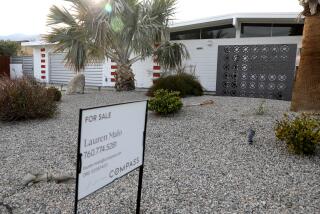New Home Auctions Gain in Slow Market
- Share via
WASHINGTON — “If you have a Rembrandt to sell, what do you do with it? Take it to your local art gallery? Or call Christie’s for auction? Valuable horse flesh is sold at auction, just like wine. And what is the stock market? One big auction.”
So says Darrell Hoover, president of R. Thomas Ashley, a division of Hoover Financial Group in Newport Beach. Hoover also said that by the year 2000, up to 30% of all real estate sold will be sold at auction.
Auctions, once a strategy of a troubled financial institution trying to unload distressed properties quickly, are gaining acceptance in the conventional real estate market.
“We’re the busiest we’ve been in 13 years,” said William McMorrow, chairman of Kennedy-Wilson Inc., a Santa Monica-based auction company.
In some countries, such as Australia, auctions are used, not as a last resort, but to sell the best properties--the high-priced ones, in the best neighborhoods and the hottest markets.
At the high end of the market, auctions are employed in about half the sales in Melbourne, said Kenneth Lusht, director of the Institute for Real Estate Studies at Penn State University and author of a report about Melbourne’s flourishing auction business sponsored by the National Assn. of Realtors.
Auctions have a long history. The earliest references to auctions of grains and slaves predate Christ. They were used routinely to sell all sorts of commodities of indeterminate value throughout this country’s early days in both rural and urban areas.
The Civil War, however, did a terrible disservice to the auction. The federal government used auctions to liquidate large amounts of government property quickly to finance the war effort. Eventually, auctions became enmeshed in creditor-debtor laws and served only to liquidate goods quickly to extinguish debts. And that was where they were imbued with their scruffy reputation.
It was not until the 1970s and early 1980s, when interest rates rose sky high, that financial institutions were faced with the need to sell holdings quickly. In experimenting with a number of alternatives, including swaps and owner financing, they rediscovered the auction.
The quick sale of distressed properties, however, is not the only circumstance in which an auction works well. There are several ideal markets for auctions, said Steven Good of Sheldon Good & Co., a Chicago-based firm that evolved from a traditional real estate brokerage in the early 1970s to one of the country’s largest real estate auction houses.
Among the ideal auction markets, Good listed:
--A slow market or one with excess supply in which a builder anticipates holding properties for a long period. In this instance, he might choose an auction over a conventional sale because of the high cost of holding a property in order to pay taxes, maintenance and ongoing marketing.
“A developer has to be able to increase prices 20% to 30% each year, just to break even,” Good said. “Even if he has to sell at a discount, he is usually money ahead with a quick sale.”
--The volatile market, one moving up or down quickly. Here the auction functions as an evaluation tool. For example, when the California market was so hot a few years ago, stories abounded about people standing in driveways of homes for sale, bidding late into the night. What were those but informal auctions?
--Declining or stagnant markets. In these times, auctions are used often as a tool to work out financial problems between developers and lenders. It is a situation in which selling quickly will minimize losses.
What has been left out is the normal market, but some proponents see a future there too.
“The auction’s emerging trends are banks and savings and loans, builders and governmental agencies,” Hoover said. “But the future is the almost untapped traditional resale market.”
And that may be the reason the National Assn. of Realtors, which once looked askance at auctions, met recently with members of the National Assn. of Auctioneers to learn how real estate agents can incorporate the auction into their traditional sales approach.
“We are trying to educate our members who are not familiar with the process to recognize an auction situation,” said Kenneth Kerin, senior vice president of the NAR and its staff director of the National Real Estate Auction Committee. “The auction is not always the last resort for selling a property. Sometimes it should be the first.”
For the seller, the advantage of an auction over a traditional sale is speed. The seller may pay more for that speed, however. Besides the up-front fees for advertising, auctioneers charge a commission of between 4% and 10% of the final sales price.
For the buyer, the advantage is often a lower price. Discounts range from 15% to 45%, said one auctioneer. But that is not always the case. In his study of the Melbourne market, Lusht found that auctions brought prices of an average of 7% higher than conventional sales techniques.
Proponents argue that an auction actually determines that real market better than the conventional sales process.
“With an auction, it is argued that the merits of a property tend to be relatively more important in determining sales price than the bargaining strengths of the seller and potential buyer,” Arthur L. Wright said in a 1989 study for the NAR.
“Sale terms are set prior to the auction and competition occurs among buyers rather than between the seller and a potential buyer. Thus, the technique places more emphasis upon marketing and less upon negotiating strategies than privately negotiated transactions--with or without the assistance of a real estate broker.”
The whole process is in many ways similar to a conventional sale, but more compressed and considerably more tense. An auction often sports a bit of a circus or carnival atmosphere.
For example, at Sheldon Good & Co., the auctioneers don auction uniforms--blue suits adorned by red carnations. Music plays in the background of the hotel auditorium or space rented for the event, and typically there is a cash bar at the back of the room.
There are glossy brochures, audio-visual presentations and, for national auctions, even satellite hookups. Sheldon Good, Steven’s father and the firm’s founder, arrives in his bronze Rolls-Royce.
In Melbourne, auctions have a more down-home feel and they are usually held on Saturday mornings on the front steps of the property for sale.
Usually, the entire sales process takes four to six weeks. When a seller signs a contract with an auction company, he or she is expected to pay certain up-front fees for advertising and marketing.
After blitz-style advertising in the market’s major newspapers, there will be a marathon series of open houses with a full staff of salespeople. Colorful sales brochures are printed and provided to prospective buyers, who visit the properties an average of 3.2 times prior to attending an auction to bid. The goal of those marketing the property is to attain a critical mass of buyers.
The marketing and open houses are familiar traditional techniques. But some preparation for an auction sale are quite different. Because auctions only work when bids are all on the same terms, the usual series of inspections is often performed in advance. Also, before the auction the seller usually chooses a “reserve,” or base price. If the best offer is below that amount, the seller is free to turn down the deal.
Usually buyers are required to submit a cashier’s check in an amount equivalent to 10% of the day’s minimum bid. If a buyer is successful, he or she must write a check immediately for the balance of the down payment.
Many major auction companies have a whole microcosm of the real estate industry available on auction day, including appraisers and loan officers, so that before the buyer has left, he or she has signed a sales contract, made a down payment and filled out all the required paper work.
If auctions are the future, the question will become what does the future hold for auctions?
If auctions gain as much market share as some are predicting, it is likely that they will be more regulated, Lusht said. Although state requirements vary widely, in California a person must hold both an auctioneer’s license and a real estate license to sell real estate at auction.
There are about a dozen major auction houses nationwide, and already a number of big real estate brokers are moving into the market, either by forming partnerships with established operations or by starting their own auction divisions.
The auction organizations don’t seem too worried about the competition. Of the 3.6 million existing houses sold in 1988, auctioneers sold 18,300. If they gain a 30% market share, as some predict, the total will be so large that there will be enough business for everyone.
More to Read
Inside the business of entertainment
The Wide Shot brings you news, analysis and insights on everything from streaming wars to production — and what it all means for the future.
You may occasionally receive promotional content from the Los Angeles Times.










